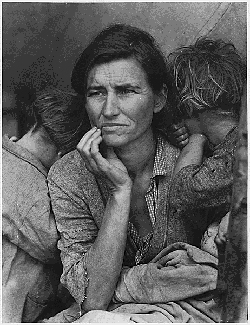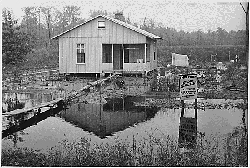


The Great Depression began in October 1929, when the stock market in the United States dropped rapidly. Thousands of investors lost large sums of money and many were wiped out, lost everything. The dramatic crash of the stock market on "Black Thursday", October 24, 1929 when 16 million shares of stock were quickly sold by panicking investors who had lost faith in the American economy.
At the height of the Depression, 12,830,000 people were unemployed. The American dream had become a nightmare. Banks, stores, and factories were closed and left millions of Americans jobless, homeless, and penniless. Many people came to depend on the government or charity to provide them with food. American business and labor were both in serious trouble.
The Great Depression began in the United States but quickly turned into a worldwide economic after World War I. The United States had emerged from the war as the major creditor and financier of postwar Europe, whose national economies had been greatly weakened by the war itself, by war debts, and, in the case of Germany and other defeated nations, by the need to pay war. The Depression hit hardest those nations that were most deeply indebted to the United States, i.e., Germany and Great Britain. Many other countries had been affected by the slump by 1931.
The Great Depression had important consequences in the political sphere. In the United States, economic distress led to the election of the Democrat Franklin D. Roosevelt to the presidency in late 1932. Roosevelt introduced a number of major changes in the structure of the American economy, using increased government regulation and massive public-works projects to promote a recovery. But despite this active intervention, mass unemployment and economic stagnation continued, though on a somewhat reduced scale, with about 15 percent of the work force still unemployed in 1939 at the outbreak of World War II. After that, unemployment dropped rapidly as American factories were flooded with orders from overseas for armaments and munitions. The depression ended completely soon after the United States' entry into World War II in 1941.
After the Great Depression, government action, whether in the form of taxation, industrial regulation, public works, social insurance, social-welfare services, or deficit spending, came to assume a principal role in ensuring economic stability in most industrial nations with market economies.
Bibliography
College, Lonestar, "American Cultural History".
http://kclibrary.lonestar.edu/decade30.html, April 28, 2009.
Company,New York, "20th Century History".
,http://history1900s.about.com/library/photos/blyindexdepression.htm. April 29, 2009.
Frank E. Smitha, "The Great Depression, to 1935".
http://www.fsmitha.com/h2/ch15wd.html, April 30, 2009.
2